Businesswoman Promotes Entrepreneurship, Thrives in Creative Industry
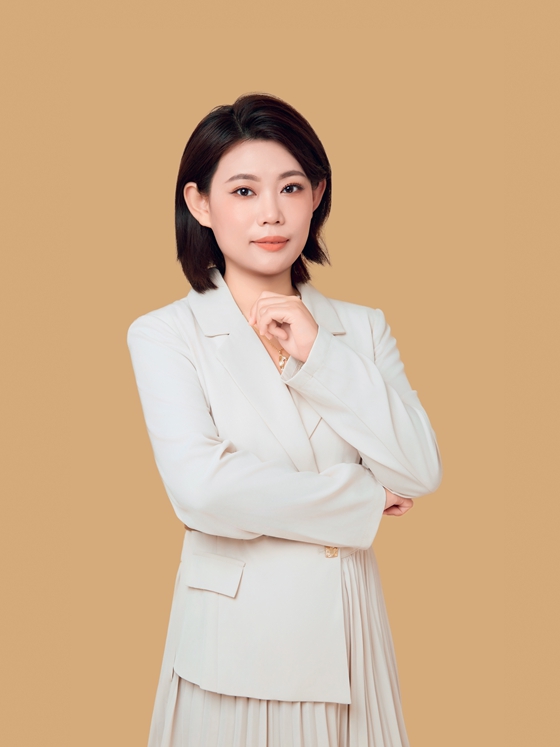
Huo Yingying, cofounder of YiPoint, a brand design and communication company in North China's Tianjin Municipality, has accomplished much within the cultural and creative industries. More importantly, she has set a good example for women who are pursuing their entrepreneurial dreams. "I will continue to shoulder my mission, bringing warmth to and providing support to women founders of startups," says Huo.
Breaking Through
More than a decade ago, China witnessed a boom of startups by youth; as such, the number of businesses founded by young people mushroomed across the country. In 2013, Huo quit her stable job, with a securities company, to ride the wave of startups. She and Gong Shukai, her partner, opened an online shop, through which they have been providing creative advertising and design services to small and medium-sized enterprises.
As with anything, the first step is always the hardest. Huo did not receive any orders during the first few months. The shop was not profitable. Despite the difficulties, she insisted on pursuing her entrepreneurial dream.
"I will never ever forget our first order. A customer, in Northwest China's Gansu Province, contacted us, online, to design a banner. We made five versions overnight. The customer was moved by our sincerity. Even though we only earned 50 yuan (US $7.04), the order filled me with confidence, and it gave me unlimited motivation to pursue my entrepreneurial dream. I believed we would receive an order of 100 yuan (US $14.08), 10,000 yuan (US $1,408.45), or even 100 million yuan in the future," Huo recalls.
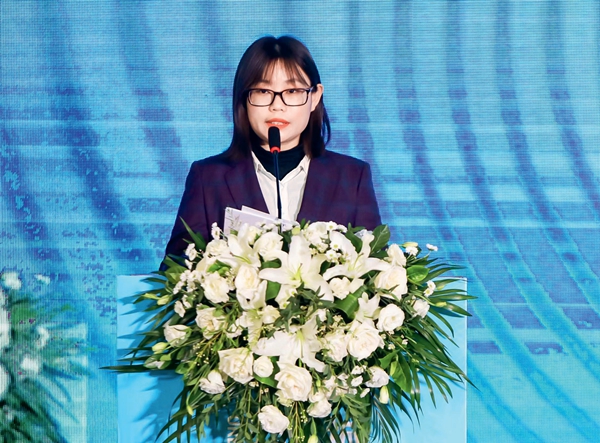
Since then, Huo has insisted on serving customers with sincerity, providing them with quality designs, and helping them build their brands on the Internet. That sincerity helped Huo build the business; her shop received many orders during the next few months, and many of those clients became repeat customers. She hired several designers. YiPoint grew rapidly, and the influence of the brand steadily increased.
In 2017, Huo expanded the business. Under her leadership, YiPoint began working with Zonsen Industrial Group; together, they established Humi, a network technology company, through which they built an industrial-digital platform. Now, it is one of the leading industrial-digital platforms in China, and it has developed digital transformation and upgrading plans for nearly 50,000 manufacturing enterprises.
Huo has always been enthusiastic about social services, and especially about public welfare. In recent years, Huo's team has helped advertise the Yangbi walnut, a specialty agricultural product in Yangbi Yi Autonomous County, in Southwest China's Yunnan Province, for free. YiPoint donated 17 million yuan (US $2.39 million) to support the development of agricultural and e-commerce industries in a county in Gansu Province. YiPoint has also donated money to in-need students in a county in Gansu, and it has established a fund to help 10 prospective college students pursue further studies.
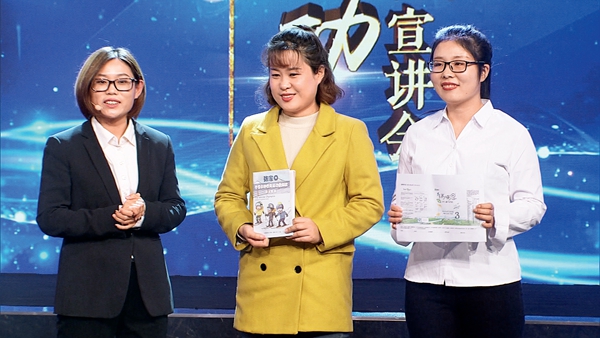
Digitization of Cultural, Creative Industries
During recent years, digital technology has become an increasingly important driving force in promoting the prosperity and development of cultural industries. Huo's team has combined the digital economy with the cultural and creative industries, adding digital "wings" to the industries.
While explaining her understanding of the development of new quality productive forces within the cultural and creative industries, Huo says new quality productive forces are key to promoting the high-quality development of the digital cultural and creative industries. And, Huo says, strengthening technological innovation, including content creation, talent training and business-model innovation, is necessary for the development of new quality productive forces within the industries.
Huo believes technological innovation is the core driving force of a company's development. "In the digital era, the introduction of cutting-edge technologies, including artificial intelligence, big data, cloud computing, VR (virtual reality) and AR (augmented reality), helps create finer digital cultural and creative products more efficiently, and it helps expand the cultural connotation and forms of cultural and creative products. The application of technologies can also provide customers with an immersive experience, to enjoy the fun of creating cultural and creative products by themselves," says Huo.
She has always encouraged her employees to explore traditional Chinese cultural resources, and to combine traditional elements with modern aesthetic concepts, when creating digital cultural and creative products. She has also attached great importance to cultivating her employees' quality and innovation capability, by providing vocational training and building practical platforms.
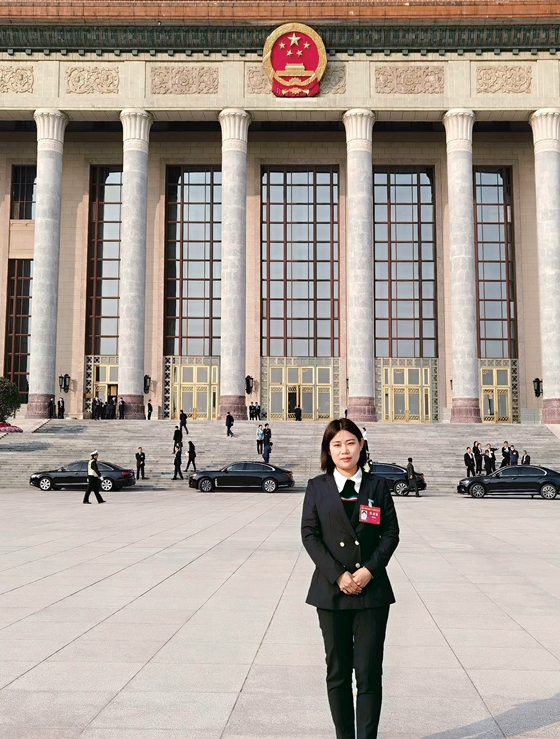
Establishing Cultural Brands for Cities
Huo believes culture is the "soul" of the cultural and creative industries, and she has striven to promote cultural inheritance and development. Huo and her team have helped more than 20 cities design their images, develop distinct cultural and creative products, and organize cultural activities, all aimed at disseminating the cities' cultures, and at making the cities' voices heard by more people.
In 2018, Tianjin applied to join the UNESCO (United Nations Educational, Scientific and Cultural Organization) Creative Cities Network, in the field of Creative City of Design. As an important participant in the application process, YiPoint in 2020 hosted the fourth World Intelligence Congress. During the congress, a "cloud exhibition hall," established by Huo's team and Tianjin Science and Technology Bureau, displayed, in an all-round way, the design concept of Tianjin, and the city's various design industries.
Earlier this year, Huo's team and other enterprises combined to establish an account on Douyin, an online video-sharing platform in China. The account will showcase Tianjin's unique cultural charm, time-honored history and abundant tourism resources. It will be a "teller," who tells the city's stories. Huo has also led her team's participation in the city's cultural-innovation work, including developing souvenirs, promoting the innovative operation of intangible cultural-heritage brands, and the marketing of cultural and creative products.
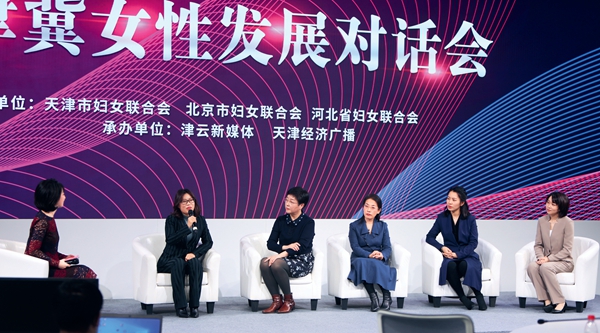
Promoting Entrepreneurship
Huo has recorded achievements in the cultural and creative industries, and she has set a good example for women who establish startups. Huo, who is a member of the executive committee of the women's federation of Hongqiao District, in Tianjin, established a studio to provide services to women in need. She has shared her entrepreneurial experiences during activities organized by women's federations, at different levels, to encourage women to participate in entrepreneurship and innovation endeavors, and to contribute their wisdom and strength to the building of a strong country and the realization of national rejuvenation.
"Every year, countless young women choose to start their own businesses. Many of them fail, due to lack of resources and a sufficient support platform. We have established an online platform, to provide support and cultural and creative resources to women who have entrepreneurial dreams … If women entrepreneurs plan to establish companies in our cultural and creative industrial parks, we will provide them with preferential settlement policies and standardized services, including site selection and interior design and decoration," Huo says.
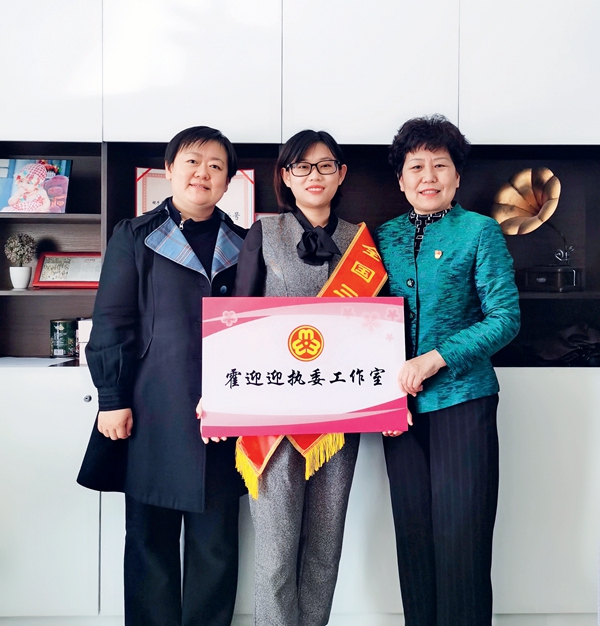
YiPoint hosts the creative-industry summit twice a year, and it holds a domestic and foreign creative works exhibition every September. Huo hopes to provide more opportunities to creative talents to communicate about excellent design works, and about the trends (at home and abroad) of creative industries.
To date, YiPoint's online platform has linked 50,000 creative suppliers and 300,000 professional creative talents, of which 60.1 percent have been women. In 2018, the women's federation of YiPoint was established, and Huo served as its first president. In 2023, the company's "online women's federation" was officially launched, and it has since aimed at providing a warm home for women creative workers. The "online women's federation" has several sections, including rights protection, political education, all-round ability improvement, and entrepreneurship and employment support. It offers help to women who encounter difficulties, in both work and life.
"I felt honored when I attended the 13th National Women's Congress of China (in October 2023) as a delegate. After the congress concluded, I promoted the spirit of the congress to my company's women employees, and to women creative workers in the industrial parks, through the 'online women's federation.' In the future, the company's women's federation will make greater efforts to encourage more women to foster stronger family ties, values and traditions, to make contributions at their posts, integrate their pursuit of ideals into the overall interests of social development, and to collectively write a new chapter in advancing Chinese modernization," Huo concludes.
Photos from Interviewee
Source: Tianjin Women's Federation
(Women of China English Monthly July 2024)
Editor: Wang Shasha
Please understand that womenofchina.cn,a non-profit, information-communication website, cannot reach every writer before using articles and images. For copyright issues, please contact us by emailing: website@womenofchina.cn. The articles published and opinions expressed on this website represent the opinions of writers and are not necessarily shared by womenofchina.cn.?

 京公綱安備 11010102004314號
京公綱安備 11010102004314號